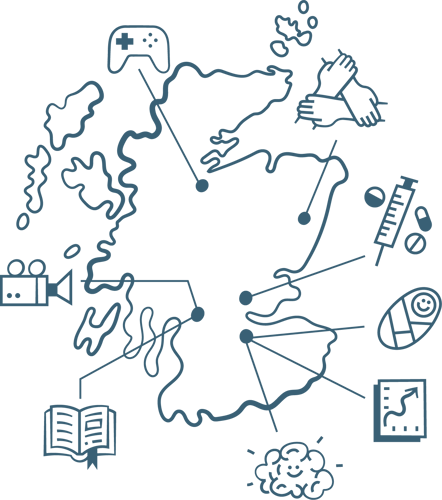1000+
Subscribers to public and partner newsletters
Learn how we're working collaboratively with partners, stakeholders and the public.

Since April 2023, through a Memorandum of Understanding (MoU), RDS has received additional funding to support Scottish Government with the delivery of elements of the Administrative Data Research (ADR) Scotland programme.
This includes carrying out practical data work around preparing and updating datasets before they are added to the National Safe Haven, as well as improving how the data is prepared, working closely with the Data Discovery Team in Scottish Government. This in turn helps researchers access the data. In response, our data team has grown, ensuring we have the expertise to take on all of the activities involved.
A part of the wider ADR UK programme funded by the Economic Social Research Council (ESRC), the ADR Scotland programme is helping to make administrative datasets more readily linkable and securely available for research on a suite of critical issues in Scotland, including:
As well as working on the datasets themselves, we are bringing automation into the data curation process to create efficiencies in how we work.
Our analysts have taken manual processes such as data cleaning, splitting data, and generating demographic and storage keys, and set up reusable systems within a Reproducible Analytical Pipeline. This pipeline is developed further with each project that is completed, continuously making the process quicker and improving the quality of data produced.
“The creation of the Reproducible Analytical Pipeline is an exciting development within our data curation work. While the groundwork required to automate these processes can be labour intensive, it’s already proving to be incredibly rewarding as we begin to complete data sets to a very high standard and at a faster pace.”
Datasets our analysts are working with Scottish Government, National Records Scotland and EPCC to prepare for ingest into the National Safe Haven include:
Other datasets that we are updating so the very latest information is available include:
The Pupil Census is our first dataset that we have completed work on as part of our role in ADR Scotland.
Over 700,000 records from Scotland’s publicly funded schools are added every year, providing unique data not collected elsewhere, from school-level data on aspects such as class sizes, to person level data that covers variables on protected characteristics. Linked with a dataset such as the Child Health and Wellbeing Census, it can become a powerful resource for researchers.
Through indexing work carried out by National Records Scotland (NRS), the Pupil Census – and through it, all education datasets – can also be linked to other types of data, such as health or geographical. This creates the opportunity to investigate more complex questions, such as investigating links between class sizes and health conditions, or exam results with location. This all works to broadening our understanding of how public services can be improved for our citizens.
Jen Muir, Data Analyst, added: “The Pupil Census is the thread that can help us to bind together all other datasets we have within education. By doing so, we can increase our understanding of the information held within them.
“And not only within education. NRS’ indexing of the Pupil Census opens up a world of possibilities for linking to many different types of public sector data, allowing us to see the links between education and issues like health and wellbeing.”
We are committed to embedding public engagement throughout our activities and beyond. Last year we focused on:
In 2023, we joined forces with Scottish Centre for Administrative Data Research (SCADR) to reinvigorate a joint public panel called Scotland Talks Data. The panel includes 20 people representing the population of Scotland from diverse backgrounds and lived experiences of a range of issues covered in our research. The panel participants have helped researchers and partners better understand public viewpoints on the use of administrative data for research by advising on issues around public trust and acceptability, discussing research proposals and helping us to communicate our work in a clear and accessible manner.
In May 2023, we sponsored the ScotPEN (Scotland Public Engagement Network) annual gathering, which enabled public engagement professionals from across Scotland to attend this vital event to share good practice and expertise from across different sectors.
We piloted a Public Engagement Fund in 2023. A total of £56,856 was awarded to projects that help promote public understanding of data research in Scotland. Originally capped at £40,000, RDS increased the total amount of funding available to support a wider range of top-quality projects.
The aims of the Public Engagement Fund were to:
The eight funded projects exceeded expectations reaching over 2,700 participants including people who had not engaged with data science before.

The following projects were carried out across Scotland:
Grampian Regional Equality Council ran a series of workshops with minority ethnic community groups in Aberdeen. Completed as part of the council’s ‘How Fair is North East Scotland?’ project, it aimed to capture quantitative and qualitative data across local communities. 40 participants, who had lived experience of immigration, discussed issues around data research and informing policymaking.
The University of Dundee led the ‘My Data’ project to engage with groups of people who are in recovery from drugs and alcohol use and explore perceptions of the use of administrative data in research. This project produced an animation, which included the voices of those who are often left out of research – demonstrating a key aim of the Fund which was to widen participation for those who do not normally engage in data science.
Generation Scotland is the largest family health and wellbeing longitudinal study in Scotland. They used the funds to create resources to actively engage with diverse audience groups with a focus on underrepresented groups including young people, LGBTQIA communities and those in rural Scotland. To do this, they visited Glasgow Science Festival, Edinburgh Science Festival, and ran a webinar with Rural Mental Health Forum.
‘Mental Health – Imagining Beyond’, led by The University of Edinburgh, focused on identifying gaps where data may not reflect lived experiences, such as how stress is recorded in data versus how it is experienced in the community. The team worked with the Community Wellbeing Collective (CWC) in Wester Hailes for creative approaches of identifying questions that are urgent to their community.
The University of Glasgow Schools Health and Wellbeing Improvement Research Network (SHINE) worked with pupils in-person at schools across Scotland, as well as with teachers and parents/carers online, to engage them in conversations about data linkage and mental health in schools. Data linkage of this kind provides greater insight into the determinants and outcomes of mental health and allows for increased utility of the data, which can inform policy change. The project produced resources to help pupils, teachers and parents understand the use of data in research and wider public benefits.
Building on research from a population-wide statistical analysis of administrative data on all mothers in Scotland, the project, led by a team at the University of Glasgow, produced shareable resources about perinatal mental health. An animated short film featuring completed statistical analysis of the data was premiered at the Scottish Mental Health Arts Festival in October 2023, and is now available as a resource to provide information and support to a wide, ongoing audience.
A team from the School of Biological Sciences at University of Edinburgh used the computer game Minecraft to encourage young people to explore pandemic preparedness and how large-scale data can be used to inform policy. The Data in Biological Research project carried out workshops in Fife and Inverness in summer 2023, and in the Highlands through a collaboration with Science Skills Academy reaching over 1000 people.
Scottish social innovation charity People Know How worked with the Binks Hub to produce a digital citizen research project. The team used the funds to train five of the charity’s volunteers who went on engage with people about digital inclusion to learn more about the obstacles that prevent people from engaging with services.
We are leading the transformation of Scotland’s public sector data system to align and simplify policies and approaches, and to deliver improvements.
Since our creation as a charity in 2021, we’ve been working with our partners to make tangible progress. Collaboration across the public sector is crucial to our collective success.
The Researcher Access Service is being developed in collaboration with eDRIS (part of Public Health Scotland). In early 2024, RDS signed a Service Level Agreement with Public Health Scotland (PHS) that outlined how we will work together to develop and run the Researcher Access Service, and widen the range of health data available for research. We have close relationships with academia with the University of Edinburgh, a founding partner, and the universities of Aberdeen, Dundee and Glasgow who work with us through the Regional Safe Havens Network. We also have an agreement with EPCC who manage the National Safe Haven on behalf of PHS.
Additionally, we have signed Memorandums of Understanding (MoU) with the Scottish Centre for Administrative Data Research (SCADR) and SAIL Databank.
The agreement between RDS and SCADR will see both organisations continue to work collaboratively to achieve shared aims, including joint working on the ADR Scotland programme, investigating funding opportunities for collaborative development projects, and sharing insights on developments in the data landscape. The new Memorandum of Understanding (MoU) builds on the existing RDS/SCADR Public Engagement and Involvement MoU, which sees the two organisations develop and maintain the ‘Scotland Talks Data’ public panel, empowering members of the public to have a voice on the use of administrative data for research.
Building on an existing partnership, the MoU for RDS and SAIL Databank highlights the insights being generated through public sector data research in the devolved nations and advocate for future developments and improvements to data access. The collaboration will involve sharing knowledge to advance both organisations’ shared goals and investigating options for collaborative working and securing joint funding.
As well as our work on the ADR Scotland programme, other organisations with which we work closely include:
HDR UK, Office for National Statistics (ONS), DARE UK, Understanding Patient Data (UPD), the Scottish government’s Chief Scientists Office, Public Engagement in Data Research Initiative (PEDRI), and The Data Lab, among more.
1000+
Subscribers to public and partner newsletters
279k
Social media impressions since Sept 2021
2
All-partner events held, with over 60 attendees in person and online
7
User forums and webinars hosted
We also received invitations to speak at the Scottish Parliament and sponsorship of leading events including The Scotsman Data Conference, Holyrood Connect, Future Scot and The DataLab Data Summit.